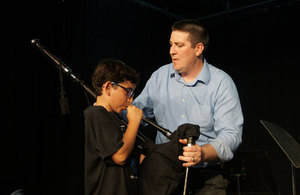From the Highlands to the hills of Beit Mery
Visiting British musicians in Lebanon to rehearse with the Lebanese Army pay a surprise visit to LeBam's young musicians to play some tunes

Piper Jason with LeBam musician
On Saturday the young musicians of LeBam’s Beit Mery branch were treated to a surprise visit from a troupe of visiting British musicians, including a trumpeter, tuba player, flautist, percussionist and piper. The musicians were in Lebanon to rehearse with the Lebanese army, as well as advise them on instrument repair, musical composition and arrangement techniques.
After bandmaster Rob conducted a concert band rehearsal of ‘The Highland Cathedral,’ the brass players had the audience clicking along to a rendition of ‘The Pink Panther.’ “I was hugely impressed by the genuine enthusiasm of the children and staff; it’s projects like this that renew my faith in the power of music education and its extended benefits to society,” said Rob.
But the star of the show was piper Jason, who explained the fascinating history of the Scottish bagpipe before letting some of LeBam’s young musicians have a go on the pipes themselves.
The Lebanese Band Association for the promotion of Music (LeBAM) is a non-profit organization, which aims to develop and disseminate music performed by community-based bands and orchestras, to promote culture, diversity, development and citizenship. LeBAM teaches music for free for young people aged ten to eighteen, as well as providing their instruments. It currently caters to around 350 students organized in four centres: Beit Mery, Baskinta, Baakline and Tripoli.
Elie Roumieh, an intermediate trombone student said:
It is really amazing to have one single bagpipe playing with a full band where you can feel the real effect of the music written.
Antoine Rayess, National Coordinator of LeBAM added:
it was amazing to give our young talents this opportunity of knowing the history of the bagpipe.
Bagpipes – did you know?
- There are two main styles of music played on the bagpipers, Ceòl Mór and Ceòl Beag, which in Gaelic means ‘big music’ and ‘little music’. The former tends to be slow, stately and complex, while the latter refers to dance tunes such as reels and jigs.
- The bagpipe can play nine notes, from G to A; however, there are no sharps or flats, so there is no need for a key signature.
- The oldest reference to bagpipes appear in Alexandria, Egypt, in about 100BCE.